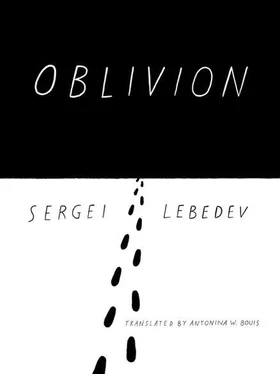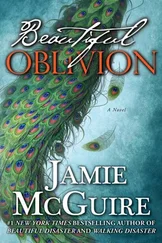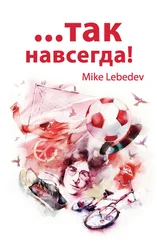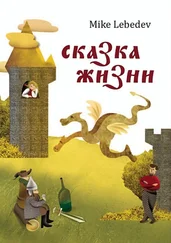At the end of summer, we made jam at the dacha—Grandfather II helped, washing the copper tubs; foods were canned—he brought over jars sterilized by boiling. Gooseberries, currants, apples—the fruity summer moisture, the summery juice was boiled, thickened, the summery fruitful time was canned for winter, cold and dark; the summery aromatic herbs were put into jars with cucumbers, tomatoes, and squash, they were used to separate layers of mushrooms in pails, which emitted burbling, drooling juices.
A family is made up of various people with a shared attitude toward time, and Grandfather II was gradually accepted into that circle, first as not a stranger and then as one of us. Novels, magazines, and newspapers were read aloud to him—his housekeeper read woodenly, without intonation, the book did not let her inside—and he talked about the past, very abruptly, as if constantly bumping into the borders of an area he had promised himself not to discuss, and my family formed the opinion that somewhere in his past there was a drama, an injustice, perhaps an arrest, an exile, a prison term. Grandfather II liked table games, lotto, cards, but someone had to sit with him and with a touch tell him what move to make, and the dacha evening under the cloth lamp shade became quite proper thanks to him—the way evenings at the dacha should be when people of different generations got together, when no gaps existed in the generations, and everyone was kindheartedly connected because there was a person whose need was appropriate, not burdensome and who could be easily helped; the tubby lotto barrels tumbled along the table, the cards were placed on the tablecloth, it grew late, and it was probably even too agreeable to sense that evening was closer for some and farther for others; the evening of life.
Thus, bit by bit, Grandfather II entered our family. Of course, he never interfered in affairs that were profoundly personal; if something important was discussed in his presence, he settled himself in the chair in a way that showed that he considered himself properly present but without a say; with each year in these situations he sat ever more confidently in the chair, millimeter by millimeter approaching the stance of a family member and not just a friend; he became something like a notary, and he was invited when there was a serious conversation to be had.
And then once, when my mother was pregnant with me, the doctors said that giving birth was very risky and recommended an abortion; naturally, this was not discussed at the table, but the whole family knew and worried. Unborn, I was already present, grandmother was already searching the trunks for old diapers and wool to knit a cap and socks; but everything vacillated, grew, and the family—belatedly—tried to be more careful in their speech and controlled their gazes; a life was being decided and no one wanted to place the wrong calibration on the scales.
Everyone expected the decision to ripen and occur on its own; life in the household changed, swollen like a pregnant belly, filled with the murky waters of expectation. Mother was determined to give birth, but too many unspoken concerns, unfinished questions had accumulated in the house. The closer the day approached when an abortion would no longer be possible, the more some members of the family, who felt she should not carry the baby, watched with frightened and squeamish astonishment—as if looking at jars in a medical museum—as the new life, still totally belonging to physiology and therefore comparable to a disease, a tumor, prepared to appear at the cost of the possible death of the person bearing it.
All the old grievances between the two branches of the family, mother’s and father’s, manifested themselves; two bloods, two heritages met, and the fact that I—still nothing, still only a fetus in the womb—was preparing to be born this way, through mortal danger, exposed old contradictions; pitting blood against blood, family against family.
Father bore the receding, weakening blood of an ancient noble dynasty; my three great uncles on my father’s side died missing in action during the war—having set down roots in the eighteenth and nineteenth centuries, the line was dying out, finding itself in an alien time and conditions.
Mother had the blood of a southern family in which every generation bore at least ten children, and each child was much more someone’s brother or sister than himself or herself; where, if the whole family gathered, they set tables in the garden; where they were strong bodied, and when they died, they were not lost or unknown, as if the family ties—direct, second cousin, third cousin—left no one unsupervised, did not permit them to vanish without a trace; as if the blood of this family in some sense ignored the individual person, and new shoots came up, as it did after grass was mown—three times as thick.
Two bloods, two family fates were mixed in me; two past tenses sought the future verbs in me. Two forces, related to me but not to each other, my mother’s family and my father’s, came together implacably in me: Which was I to be, whom would I take after? Each side was prepared to fight to the death to keep the other from winning. People were merely weapons of those forces, blood donors.
I know that this incompatibility, just as objective as the incompatibility of proteins, this irreconcilability of two sources, not opposite but different in some other way and therefore unable to become one whole, forms the contradictions of my life today. Two loves, two hatreds, two fears—from my mother, from my father. The feeling of disunity in myself, desire bifurcated—two different desires for the same thing, arguing and competing; and fear multiplied by two. Twice as much strength to quell, stifle, sate; half as much confidence, validity, firmness; two bloods—tenacity and vulnerability, lust for life and openness to mortality—two bloods, two mutually exclusive legacies. Even when my mother was pregnant with me, they grappled with each other, tying the knot of the delayed event—the threat of death in childbirth.
It was then that Grandfather II came to our house. Unable to see the tension of the hidden conflict manifested in every look, gesture, and pose, he nevertheless learned of the argument or disagreement. In the timbres of voices, in the changed sounds at home—What do we know of what a blind person learns from the sharp and fractured sound of a fork on porcelain, the strained creak of door hinges, water pouring more voluminously and loudly than usual from the kitchen tap?—Grandfather II sensed the score of discord in the changed sounds (the way animals sense an earthquake, hear the noise of the future, for every catastrophe is also a catastrophe of time, violating its smooth flow). Silence and quiet for a blind man are material phenomena, objects grow still for him, and the edge of a chair or table is the acute angle of silence; Grandfather II recognized changes in the silence of the furniture, the drapes, chandeliers, doors, and parquet; he recognized it and like an engineer, a composer in steel and concrete who sensed that the construction did not sound right, he tried to find the region of altered sound, the region of the cavern, the split, the crack. He sought it in questions—he must have heard not only the words but also how they bumped into one another, head-on or obliquely, in passing, swallowed by the atmosphere or on the contrary, forcing it to resonate; words for him were those invisible particles whose existence physicists can determine only by the sum of the effects they produce, and these effects, of intonation, of meaning, Grandfather II literally absorbed; he straightened up, as if listening with his whole body, turning it into a resonator or radar, and he received hidden currents of events with the surface of his body.
Читать дальше












